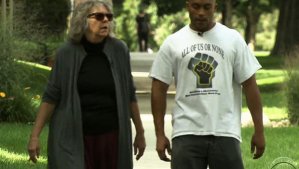EX-CIA employee admits President Obama is a radical Islamic enemy of America
AP
Vicky Nissen
August 28, 2014
It’s an explosive charge, one that practically accuses the president of treason.
If you want to receive further articles, please click on SUBSCRIBE.
Today, a former CIA agent bluntly told the newspaper, World Net Daily, that America has switched sides in the war on terror under President Obama. Clare Lopez was willing to say what a few members of Congress have said in private, but declined to say on-the-record.
Clare M. Lopez is the Vice President for Research and Analysis at the Center for Security Policy and a Senior Fellow at The Clarion Project, the London Center for Policy Research, and the Canadian Meighen Institute. Since 2013, she has served as a member of the Citizens Commission on Benghazi. Also Vice President of the Intelligence Summit, she formerly was a career operations officer with the Central Intelligence Agency, a professor at the Centre for Counterintelligence and Security Studies, Executive Director of the Iran Policy Committee from 2005-2006, and has served as a consultant, intelligence analyst, and researcher for a variety of defense firms. She was named a Lincoln Fellow at the Claremont Institute in 2011.
Lopez said the global war on terror had been an effort to “stay free of Shariah,” or repressive Islamic law, until the Obama administration began siding with such jihadist groups as the Muslim Brotherhood and its affiliates. Lopez believes that the Muslim Brotherhood has thoroughly infiltrated the Obama administration and other branches of the federalgovernment. One of the most outrageous of those appointments is Mohamed Elibiary, a senior member of the Department of Homeland Security Advisory Council. According to a report by the Center for Security Policy, Elibiary supports brokering a U.S. partnership with the Muslim Brotherhood terrorist group. Two months ago, a firestorm eruptedonline after Elibiary tweeted that a “Caliphate” is inevitable and compared it to the European Union.
Ms. Lopez also believes Obama had essentially the same goals in the Mideast as the late Osama bin Laden: “to remove American power and influence, including military forces, from Islamic lands.” The former CIA operative’s perspective affects her prescription for what the U.S. should do about the terror army ISIS, as she called for caution and restraint.
While there has been a sudden chorus of politicians and military experts calling for the immediate elimination of the terrorist army after it beheaded American journalist James Foley last week, Lopez believes the U.S. should have an overall strategy in place before fully re-engaging in the Mideast militarily.Any military action would be further complicated, she told WND, if it were not clear which side the U.S. is on, either in the short term or in the overall war on terror.
Lopez felt it was impossible to understand why the president and some of his top appointees, such as CIA Director John Brennan, who is believed to be a Muslim convert, “consistently seem to apologize for Islam, even in the face of such atrocities as the Foley beheading,” adding, they “take pains to assure the world they don’t think IS, (or the Islamic State, also called ISIS) or whichever perpetrator it was, has anything to do with Islam. How can they possibly believe that genuinely when everything these jihadis do tracks directly to the literal text of Quran, hadiths and Shariah?”
“In any case, and for whatever motivations, there is no doubt this administration switched sides in what used to be called the Global War on Terror,” she said.
I wonder if those who don’t want to go ‘on the record’ will finally speak out.




